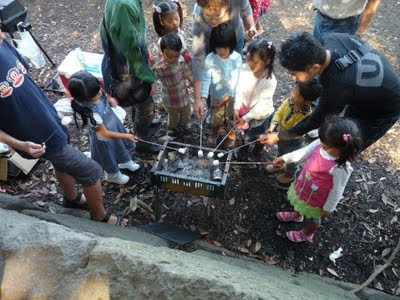This Christmas we're having a short term team from Edmonton with us, and they'll be busy with Christmas events and with an English day camp for elementary, middle school and high school students.
3,000 of these flyers will be distributed in the neighbourhood, to get the word out.
Saturday, November 21, 2009
Tuesday, November 3, 2009
60 at our BBQ!


 This is our third annual barbecue in Harumi, and we continue to grow in size.
This is our third annual barbecue in Harumi, and we continue to grow in size.The people we have some kind of contact with are invited, so that would be parents of children in the preschool or kindergarten programs, those involved in the conversational English programs, those studying the Book of Mark weekly, our believers, and anyone else who cares to attend.
Japan has a strong custom of barbecuing, but the Japanese barbecue menu is much healthier than
the Western one. More vegetables, even noodles, and small amounts of meat, often marinated or dipped in sauce. Westerners could lose weight enjoyably by adhering to Japanese barbecue customs.
So, is that the way we did our barbecue? Of course not. Everyone enjoys the juicy hamburgers and hot dogs done the Western way.
It's easier to produce the volume of food that is required when it is a Western style barbecue, since there is less work involved in grilling. Flip the
burgers, turn the hotdogs, add the barbecue sauce, and serve.
And, let's not forget the S'mores for the children. We managed not to have any flaming marshmallows or accidents with molten goo this year, so that was good. There were a lot of gooey faces and hands, though.
What's an Infiorata?

 It's flower petal art, originating in Italy, and celebrated annually on Harumi island on Tokyo Bay.
It's flower petal art, originating in Italy, and celebrated annually on Harumi island on Tokyo Bay.This is just a few steps from our apartment building, and it is set up for about a week. Lights illuminate it at nighttime, and people from some distance come to see the artwork done by community groups.
There are probably twenty or so of these works of art arranged along the walkway on the north shore of our island.
The fact that groups work together in harmony to make the infiorata is a very Japanese cultural thing. Long ago, everyone in farming villages worked together to plant the rice and then to harvest it. Modern industrial urban life has diminished the sense of community that was once a strength in every Japanese neighbourhood.
Of course, people who come into contact with a group of believers can find a sense of community that is unique, in that it is based on mutual love, rather than some form of mutual obligation. It's been the love and the community that have drawn many to learn more about Christ.
Subscribe to:
Posts (Atom)
